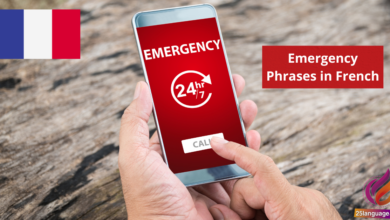French Irregular Verbs Être, Avoir, Aller, Faire

Mastering French opens doors to vibrant conversations and cultural insights, and at the heart of the language are a few essential irregular verbs: être, avoir, aller, and faire. These foundational verbs will help you express existence, posession, movement, and action—key elements in everyday dialog. By embracing their unique conjugations, you’ll empower your speech and writing, diving deeper into the rich tapestry of the French language. Let’s embark on this exciting journey together!
mastering Essential French Irregular Verbs for everyday Conversations
Irregular verbs in French frequently enough don’t follow the common conjugation patterns found in regular verbs, making them crucial for learners aiming to speak naturally and fluently in everyday situations. Understanding how to conjugate these verbs in the present tense is essential. Here are some key irregular verbs to master:
- Être (to be): Je suis (I am), Tu es (You are), Il/Elle est (He/She is), Nous sommes (We are), Vous êtes (You are), Ils/Elles sont (They are)
- Avoir (to have): J’ai (I have), Tu as (You have), Il/Elle a (He/She has), Nous avons (We have), Vous avez (you have), Ils/Elles ont (They have)
- Aller (to go): Je vais (I go), Tu vas (You go), Il/Elle va (He/She goes), Nous allons (We go), Vous allez (You go), Ils/Elles vont (They go)
| French Verb | Conjugation (Present Tense) | English Translation |
|---|---|---|
| Être | Je suis | I am |
| Avoir | Tu as | You have |
| Aller | Il va | He goes |
| Faire (to do/make) | Nous faisons | We do/make |
| Prendre (to take) | Vous prenez | You take |
| Venir (to come) | Ils viennent | They come |
To incorporate these verbs into conversation, it’s helpful to construct simple sentences. Such as:
- Je suis étudiant. (I am a student.)
- Elle a un chien. (She has a dog.)
- Nous allons au cinéma. (we are going to the cinema.)
By familiarizing yourself wiht these irregular verbs, you will significantly enhance your fluency and confidence in spoken French, particularly in casual interactions.
Unlocking the Secrets of Être, Avoir, Aller, and Faire in French
In French, four verbs play a fundamental role in everyday language: être (to be), avoir (to have), aller (to go), and faire (to do/make). These verbs are essential not only on their own but also as auxiliary verbs that help form various tenses. Here are some key points to remember:
- Être: This verb is used to describe the state of being or identity.
- Avoir: This verb indicates possession or age.
- Aller: This verb indicates movement and is often used to form the near future tense.
- Faire: This verb can refer to actions,hobbies,or creating something.
For example,you might say Je suis professeur (I am a teacher) for être,or J’ai un chien (I have a dog) for avoir. To express movement,you could use Je vais au marché (I am going to the market) with aller,and for an action,you could say Je fais mes devoirs (I do my homework) using faire.
| French Example | Verb Used | English Translation |
|---|---|---|
| Je suis étudiant. | Être | I am a student. |
| J’ai 25 ans. | Avoir | I am 25 years old. |
| Je vais à la plage. | Aller | I am going to the beach. |
| Je fais du sport. | Faire | I do sports. |
Practical Strategies for Using French Irregular verbs Effectively
Mastering French irregular verbs can be challenging, but with practical strategies, learners can grasp their usage effectively. Irregular verbs in French do not follow the standard conjugation rules found in regular verbs,which means memorization and practice are essential. one effective strategy is to group verbs by their similarities in conjugation. For instance, verbs like être (to be), avoir (to have), and aller (to go) are foundational and widely used. Here are some examples in the present tense:
- Je suis</ (I am) – Vous êtes (You are)
- J’ai (I have) – Ils ont (They have)
- Je vais (I go) - Nous allons (We go)
Another practical approach is to incorporate these verbs into everyday conversations and written exercises. Creating sentences that reflect daily activities can reinforce learning. For example, you might say, Je vais au marché (I go to the market) or Elle est mon amie (She is my friend). Additionally, using flashcards for the most common irregular verbs can also aid in memorization. The following table highlights some key irregular verbs, their conjugations, and meanings:
| French Verb | Present Tense Conjugation | English Meaning |
|---|---|---|
| être | Je suis | to be |
| avoir | J’ai | to have |
| aller | Je vais | to go |
| faire | Je fais | to do/make |
Navigating the Nuances of French Irregular Verbs with Confidence
French irregular verbs deviate from standard conjugation patterns, which can be challenging for English speakers. Understanding these nuances involves recognizing which verbs are irregular and learning their unique conjugations.here are some key points to remember:
- Common Irregular Verbs: être (to be), avoir (to have), aller (to go), faire (to do/make)
- Unique Conjugations: Unlike regular verbs ending in -er, -ir, or -re, irregular verbs frequently enough change their stems when conjugated.
To illustrate, consider the verb être:
| Pronoun | French | English |
|---|---|---|
| Je | suis | I am |
| tu | es | You are |
| Il/Elle/On | est | He/She/One is |
| Nous | sommes | We are |
| vous | êtes | You are (plural/formal) |
| Ils/Elles | sont | They are |
Another example is the verb avoir:
| Pronoun | French | English |
|---|---|---|
| Je | ai | I have |
| Tu | as | You have |
| il/Elle/On | a | He/She/one has |
| Nous | avons | We have |
| Vous | avez | You have (plural/formal) |
| Ils/Elles | ont | They have |
Insights and Conclusions
vous avez fait de grands progrès aujourd’hui dans la maîtrise des verbes irréguliers français : être, avoir, aller et faire. Ces verbes sont essentiels pour construire des phrases et communiquer efficacement en français.Vous avez découvert leurs conjugaisons, leurs rôles dans la phrase et même des expressions courantes les utilisant.
Rappelez-vous que la pratique est la clé du succès ! Essayez d’intégrer ces verbes dans vos conversations quotidiennes, même si c’est juste en vous parlant à vous-même. Faites des exercices, écrivez des phrases ou utilisez des applications pour renforcer ce que vous avez appris. Chaque étape que vous prenez vous rapproche un peu plus de la fluidité en français.
N’oubliez pas que l’apprentissage d’une langue est un voyage, et chaque petite victoire compte. Soyez fiers de vos efforts et continuez à explorer la beauté de la langue française. Vous êtes sur la bonne voie, et je suis convaincu que vous allez accomplir de grandes choses. À la prochaine leçon !





























